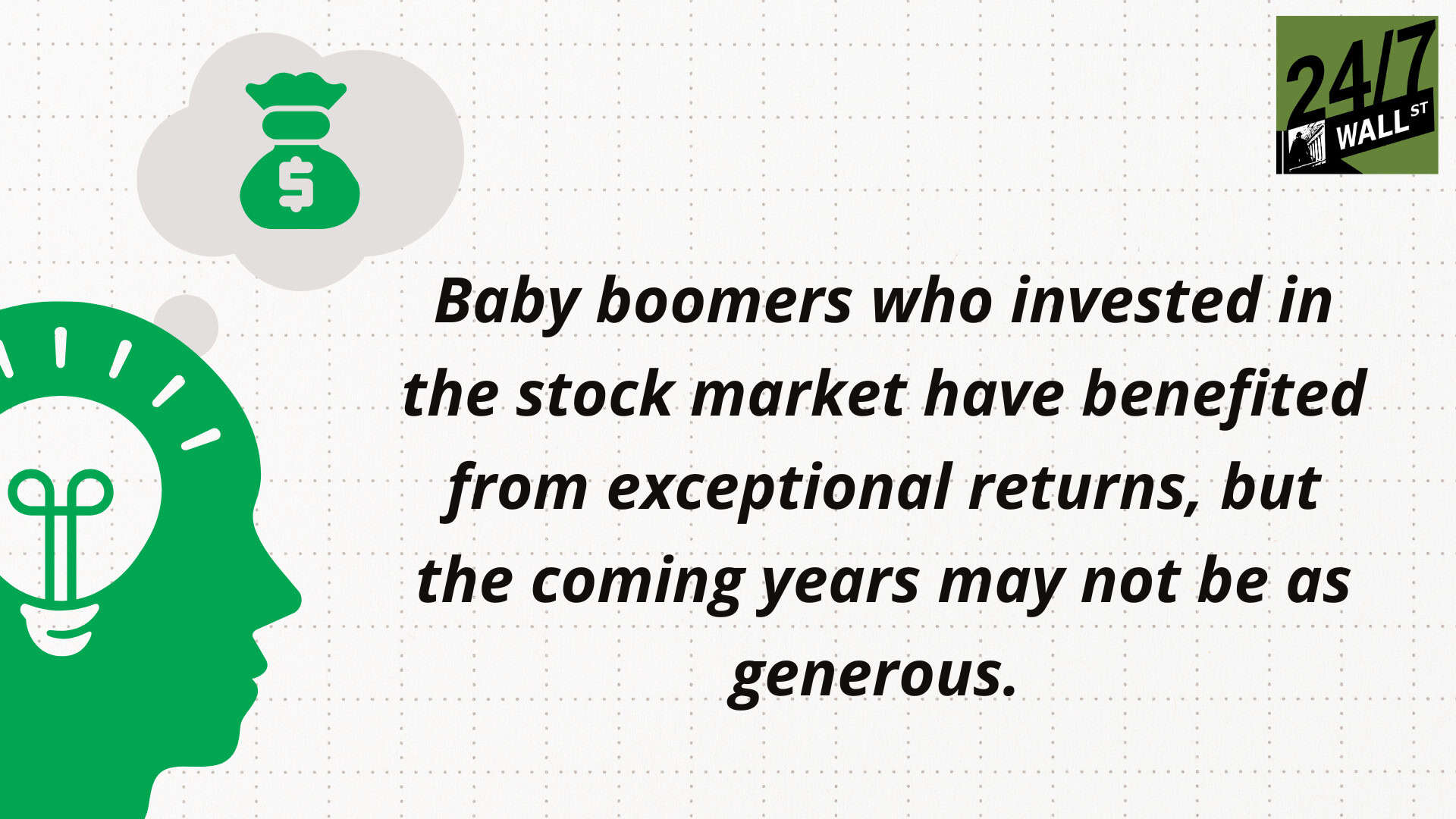
Over the past decade, baby boomers who invested in the stock market have enjoyed a period of incredible returns. From 2010 to today, the market has one of its longest bull runs in history, with annual gains averaging well above historical norms. Many retirees saw their portfolios grow significantly, bolstering their confidence in their financial security.
Even in just the past few days since the election, many Americans have seen their portfolios surge even higher.
While it’s easy to get caught up in the excitement and bask in the good times, it’s important to recognize that the next decade may not be so generous.
As baby boomers enter or continue their retirement years, several economic and investing factors could create challenges, impacting their financial plans.
Here are five key issues that baby boomers need to be aware of as they prepare for potential changes ahead.

1. Stock Market Returns Could Be Much Lower
The past decade-plus of extraordinary stock market returns has created a sense of security for many retirees, but it’s essential to remember that such growth isn’t guaranteed to continue. Historically, average stock market returns (adjusted for inflation) fall between 6% and 8% per year, yet recent years have produced much higher gains, partly due to massive monetary stimulus, low interest rates, and strong corporate earnings. If you’re looking for real-life example, just look at Europe. Equity returns for our European friends have significantly trailed the U.S. for the past decade-plus.
Indeed, the next 10 years may bring much lower returns, especially as market valuations remain historically high. Vanguard recently projected the next 10-year annualized return for U.S. equities to fall between 3.2-5.2%. Baby boomers who have relied on continued stock market growth to fund their retirement may need to adjust their expectations and diversify their portfolios to reduce the risk of a market downturn affecting their retirement savings.
2. Rising Healthcare Costs
One of the most significant financial challenges that baby boomers face in retirement is the rising cost of healthcare. According to the Fidelity Retiree Health Care Cost Estimate, an average retired couple aged 65 can expect to spend $315,000 on healthcare throughout their retirement. This doesn’t even include the cost of long-term care, which can add hundreds of thousands of dollars to the total bill.
As baby boomers age, they will likely face higher medical expenses due to increased usage of healthcare services, more frequent doctor visits, and the potential for chronic conditions. Even with Medicare, out-of-pocket costs for premiums, prescription drugs, and supplemental insurance are significant and are expected to keep rising in the coming years. Without proper planning, retirees could see healthcare costs take a large bite out of their retirement savings.
3. Increased Insurance Premiums for Homes and Autos
Another area where baby boomers may face a financial surprise is the rising cost of home and auto insurance. Insurers have faced mounting claims over the past few years due to natural disasters, extreme weather events, and inflation driving up the cost of repairs and replacements. As a result, insurance premiums have been increasing steadily, and that trend is likely to continue.
For retirees on fixed incomes, higher insurance premiums can erode their purchasing power. Homeowners in areas prone to natural disasters, such as hurricanes or wildfires, could face even steeper premiums or find it difficult to secure affordable coverage. Retirees should consider shopping around for more competitive rates, bundling policies, or raising deductibles to help offset rising costs.
4. Potential Changes to Social Security Benefits
While Social Security is not likely to disappear, there are growing concerns about the long-term sustainability of the system. The Social Security Trustees’ report indicates that, without changes, the Social Security Trust Fund could be depleted by 2034, at which point the system would only be able to pay about 75% of scheduled benefits.
If lawmakers fail to make necessary adjustments, such as increasing payroll taxes or raising the retirement age, baby boomers could face reduced benefits. For retirees who rely heavily on Social Security as a primary source of income, this could create significant financial strain. It’s essential for boomers to stay informed about potential changes to Social Security and plan for the possibility that benefits may not be as robust in the future.
5. Inflation Eroding Purchasing Power
In recent years, inflation has emerged as a critical issue, eroding the purchasing power of retirees on fixed incomes. While inflation had been relatively low for much of the past decade, 2022 and beyond have seen prices for goods and services soar, especially for essentials like food, housing, and energy.
For baby boomers, higher inflation means that the money they’ve saved for retirement won’t go as far as expected. Everyday expenses like groceries, utilities, and transportation will cost more, and this could reduce their ability to maintain their current standard of living. Without investments that outpace inflation—such as stocks or real estate—baby boomers may find it harder to keep up with rising costs.
Preparing for an Uncertain Future
The past decade may have provided baby boomers with strong returns and relative financial stability, but the next decade could present new challenges. Lower stock market returns, rising healthcare and insurance costs, potential changes to Social Security, and inflation are all factors that could impact retirement plans.
To prepare, baby boomers should take a proactive approach to managing their retirement portfolios. Diversifying their investments, exploring inflation-protected assets, and ensuring they have enough saved for healthcare and unexpected expenses will be critical. By adjusting expectations and planning for these potential challenges, baby boomers can better secure their financial future and enjoy a comfortable retirement despite the shifting economic landscape.
Get Ready To Retire (Sponsored)
Start by taking a quick retirement quiz from SmartAsset that will match you with up to 3 financial advisors that serve your area and beyond in 5 minutes, or less.
Each advisor has been vetted by SmartAsset and is held to a fiduciary standard to act in your best interests.
Here’s how it works:
1. Answer SmartAsset advisor match quiz
2. Review your pre-screened matches at your leisure. Check out the advisors’ profiles.
3. Speak with advisors at no cost to you. Have an introductory call on the phone or introduction in person and choose whom to work with in the future
Get started right here.
Thank you for reading! Have some feedback for us?
Contact the 24/7 Wall St. editorial team.



